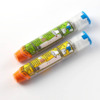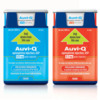A Disappointing Reality: Many Families of Food-Allergic Kids Are Not Carrying Epinephrine
by David Stukus, MD
It is a well-known fact that epinephrine is the best treatment for anaphylactic reactions. Patients or their adult caregivers are urged to always keep their epinephrine auto-injectors close at hand. Epinephrine should be given as early as possible after a reaction begins.
Unfortunately, many food-allergic children do not have immediate access to this life-saving medication. There has been much focus on making sure that epinephrine is available at school and in places where kids are away from their families. But, it appears that epinephrine may not always be available when kids are with their families, either.
An Alarming Study
My co-workers and I recently conducted a survey at Nationwide Children’s Hospital’s allergy clinic. We asked families of kids with food allergies who saw an allergist at the clinic whether they had their self-injectable epinephrine with them at the time. To a large degree the answer was “no” – even among those at the highest risk of severe reactions.
Although this preliminary study only involved 35 families, the results were so alarming that they could not be ignored:
- Most not carrying – 60% said that epinephrine should be carried at all times, but only 40% had it with them at the clinic.
- Expired devices – Of those who did have self-injectable epinephrine with them, nearly 50% were carrying devices that had expired.
- High-risk patients – Of those with the highest risk factors for a severe reaction:
- 20% had experienced a prior allergic reaction to food that required treatment with self-administered epinephrine; only 29% of these patients had epinephrine with them at the clinic.
- 90% had been diagnosed with peanut allergy; only 43% of these patients had epinephrine with them at the clinic.
- 60% had been diagnosed with asthma in addition to food allergy; only 38% had epinephrine with them at the clinic.
Why Aren’t People Carrying Epinephrine?
The most common reasons why patients say they do not carry their epinephrine auto-injectors with them at all times include:
- Inconvenience
- Forgetfulness
- Cost
- Availability at other places, such as the home, car or school
- Expiration of the previous prescription
- Complacency if there has been no accidental exposure in a long time
- Did not understand that they were supposed to carry it at all times
What All This Means
Education, as always, is key! Physicians need to start routinely asking patients if they have their epinephrine with them. For example, they should ask if they always take it to restaurants, parties, the park, etc. And everyone in the food allergy community needs to help get the word out that:
- Financial assistance is available – All available epinephrine auto-injectors have discount programs. Learn What to Do If You Can’t Afford Epinephrine Auto-Injectors.

- Prescription reminders are available – If you ask, most pharmacies will automatically reorder before your current devices expire. Check with the manufacturer of your auto-injector to see if they have an automatic expiration reminder program.
- A variety of great carrying cases are available – A list of some of the options is available here.
- There are many ways to remember your meds – I always recommend that patients keep their epinephrine auto-injectors out in the open, such as next to the car keys, book bag or purse. If you sock them away in a medicine cabinet or drawer, it’s easy to forget to grab them every time you leave the house.
- Epinephrine should not be kept in the car – Cars can get very hot or very cold. These extreme temperatures can change the medication and make it ineffective. Beyond that, though, an auto-injector that is in the car is an auto-injector that is not within reach. In an emergency, you want to be able to use your auto-injector immediately – not a few minutes later after you get the device from the car.
Remember, emergencies are never planned! Epinephrine auto-injectors are meant to be kept within reach at all times. During an anaphylactic reaction, minutes – or even seconds – count.
 Jayden is allergic to peanuts and carries his epinephrine in a red pouch.
Jayden is allergic to peanuts and carries his epinephrine in a red pouch.
For more information and the original study, see Curtis C, Stukus D, Scherzer R. Epinephrine preparedness in pediatric patients with food allergy: an ideal time for change. Ann Allergy Asthma Immunol. 2014 Jun;112(6):560-2.

Dr. Stukus is an Assistant Professor of Pediatrics in the Section of Allergy/Immunology at Nationwide Children's Hospital, in Columbus Ohio. In addition to his interest in caring for families with food allergies and other allergic conditions, he also serves as Co-Director of the Specialty Asthma Clinic. He previously completed his pediatric residency at Nationwide Children's Hospital and his fellowship in Allergy/Immunology at the Cleveland Clinic Foundation. Dr. Stukus is the co-chair of the Kids With Food Allergies Medical Advisory Team. He is married with two children.





Comments (10)